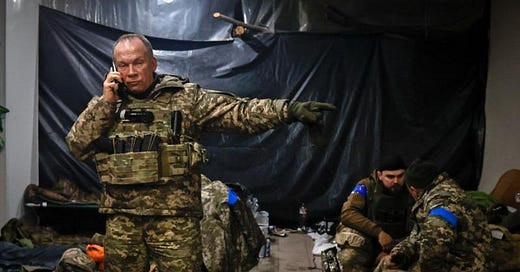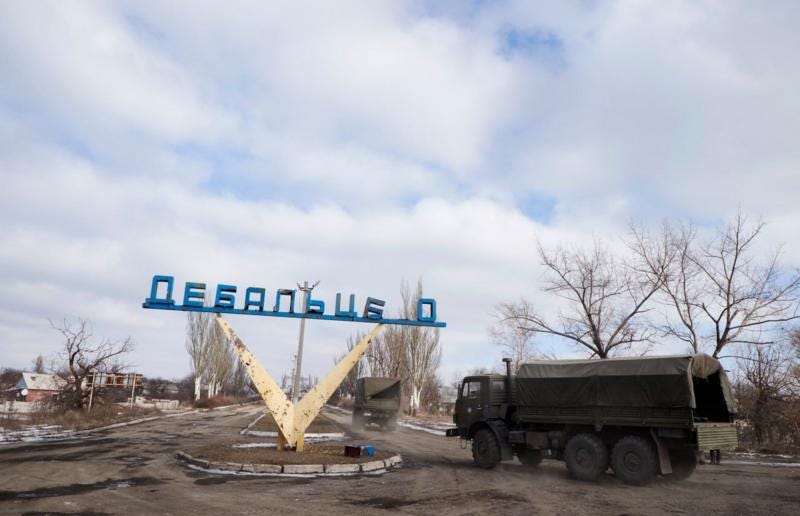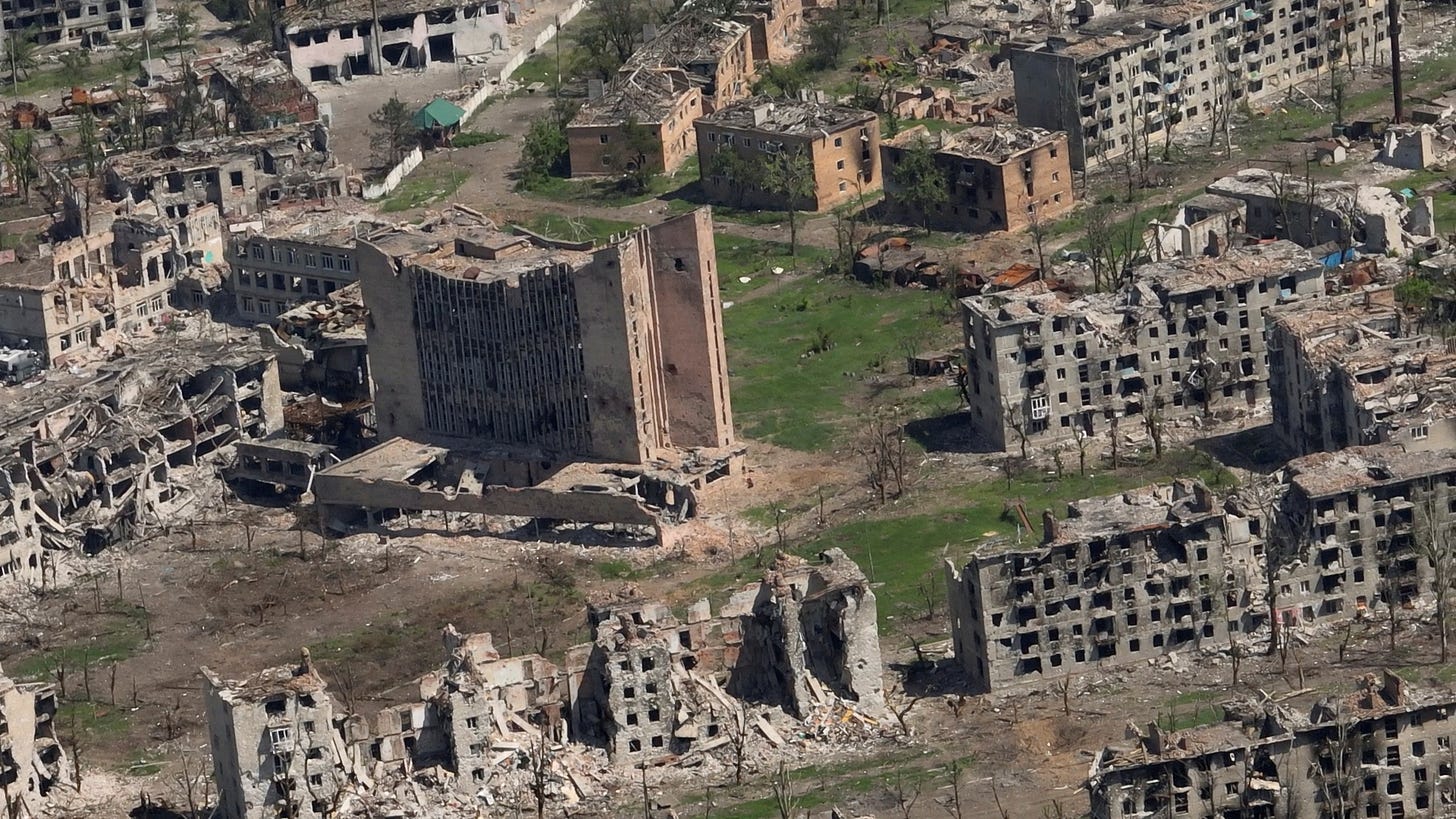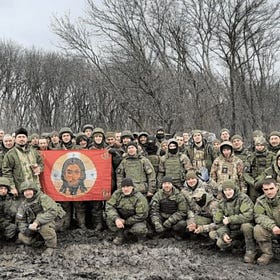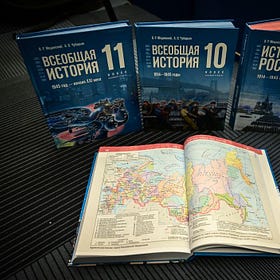"The War Mathematician" — Oleksandr Syrskyi, the new Commander-in-Chief of the Ukrainian Armed Forces
What we know of him – and what can be expected from his appointment.
By Svyatoslav Khomenko, Kyiv.
Those who know Oleksandr Syrskyi say that any talk of the war ending without Ukraine's victory gets nipped in the bud.
"He looks at the war mathematically. For him, it's just a problem that needs to be solved. And he sets his mind to do it,” says Hanna Malyar, former deputy minister of defence, who worked closely with Syrskyi. “The nature of the problem is that there is an enemy, and the enemy must be destroyed.”
Syrskyi’s name is linked with two of Ukraine’s biggest victories in the war against Russia, and the biography and experience of this 58-year-old general spoke in favour of his appointment. His critics point to his controversial reputation among the military, and say replacing the commander of the armed forces can do little to change the situation on the battlefield but may expose the Ukrainian government to serious political risk.
From Moscow to Kyiv
Oleksandr Syrskyi was born in 1965 in the village of Novinki, in Russia’s Vladimir Oblast. His father was a military man, and from childhood, the boy dreamed of following in his footsteps. In the 1970s, Syrskyi's father was transferred to serve in Ukraine, and Oleksandr finished school in Kharkiv, the city he considers his hometown.
Some relatives remained in Vladimir, but his brother Oleg Syrskyi told the Russian state news agency, TASS: "I don't communicate with him, I don't even know where he is. I don't know anything about him. He left there [to Ukraine] a long time ago. He's been there his whole life, he started and continues his military service there, he has a family there." Judging by posts on social media, Oleg supports Russia’s invasion.
An excellent student, Oleksandr Syrskyi was sent to the Moscow Higher Combined Arms Command School, which he graduated from with honours in 1986. But he has only served in Ukraine. In 2009, Syrskyi was awarded the rank of major general by the then Ukrainian president, Viktor Yushchenko.
By 2013, the last year of peace in Ukraine, Syrskyi had risen to first deputy chief of the General Staff of the Armed Forces. In this role, his responsibilities included cooperation between the Ukrainian army and NATO and the implementation of some of the Alliance's standards in the armed forces.
Exit from Debaltseve
After the start of hostilities in Donbas in 2014, Syrskyi became the chief of staff of the Anti-Terrorist Operation or ATO - the official name until 2018 of the security forces' campaign in eastern Ukraine.
In February 2015, Syrskyi personally visited the vicinity of the small town of Debaltseve in Donetsk Oblast. This was where the fiercest battles of the entire ATO were taking place. To begin with, Syrskyi's visit was aimed at trying to understand what was going on there, but he ended up commanding some of the combat clashes and later coordinated the withdrawal of Ukrainian forces from the city.
Russian propaganda described the departure of the Ukrainian army from Debaltseve as a panicked flight accompanied by a high number of casualties. Syrskyi insisted that the retreat was carefully planned and well-organised.
Later, Syrskyi held senior positions in the command structure of the Ukrainian forces in Donbas: he led the Unified Operational Headquarters of the Armed Forces of Ukraine, served as the commander of the ATO, and later, the Joint Forces Operation that followed it.
In August 2019, President Volodymyr Zelensky appointed Oleksandr Syrskyi to the post of Commander of the Ground Forces of the Ukraine army. On August 23, 2020, on Ukraine’s Independence Day, Syrskyi was promoted to the rank of lieutenant general.
The Defence of Kyiv
Shortly before the full-scale invasion of Russia into Ukraine, Syrskyi himself suggested to the country’s leadership that he should be appointed commander of the defence of Kyiv. Later, he was to declare that he never believed the Russians would so brazenly advance on the capital.
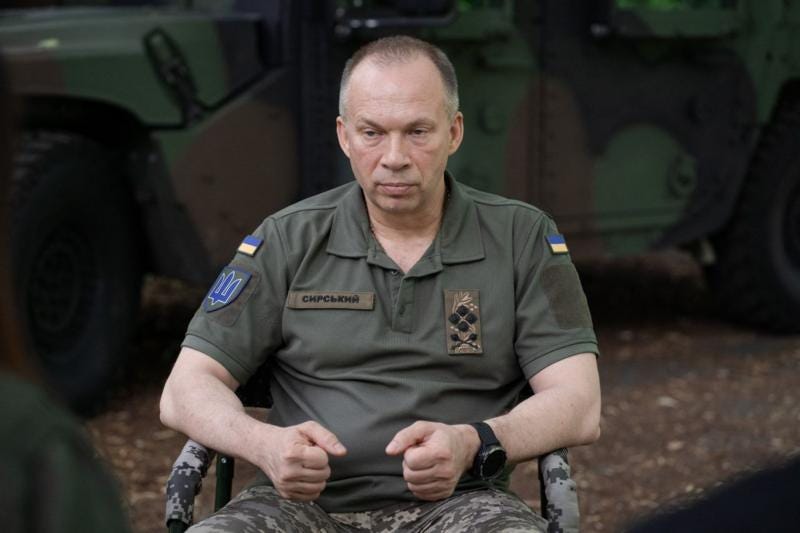
"I thought that if active combat operations were to begin, it would most likely be in the east - within the borders of Donetsk and Luhansk regions, or somewhere nearby," he told the Washington Post in an extensive interview.
"But we are soldiers. Therefore, regardless of what I did or didn’t believe, and how things looked, I still carried out all the necessary preparations."
To defend Kyiv, Syrskyi organized two rings of defence - one inside the city, the other in the suburbs. The general quickly established a communication system between the central command and the sectors into which he divided the city and its surroundings. At the same time, he allowed officers on the ground to take immediate tactical decisions. On Syrskyi’s orders, temporary battalions were created based on military academies, and the locations of army aviation, artillery, and air defence systems were changed.
A BBC source who visited one of the Kyiv command posts at this time recounts that Syrskyi did not sleep for four days after the start of the Russian invasion.
“There were two weeks with just tiny snatches of sleep,” he said in a documentary about the defence of the capital. “But we got the job done.”
Towards the end of March, 2022, Russian troops withdrew from the Ukrainian capital. The operation had lasted for more than a month, and for his role in it Oleksandr Syrskyi was awarded the highest state honour - the Gold Star of the Hero of Ukraine.
Advance near Kharkiv
After the Russians retreated from Kyiv, the main events of the war shifted to eastern Ukraine. Syrskyi led the operational-strategic grouping of troops "Khortytsa," which was responsible for the eastern sector of the front.
Syrskyi is considered the architect of the Ukrainian army’s "Slobozhansky Offensive", during which more than 500 settlements in the Kharkiv, Donetsk, and Luhansk regions were rapidly liberated in a big push in September 2022.
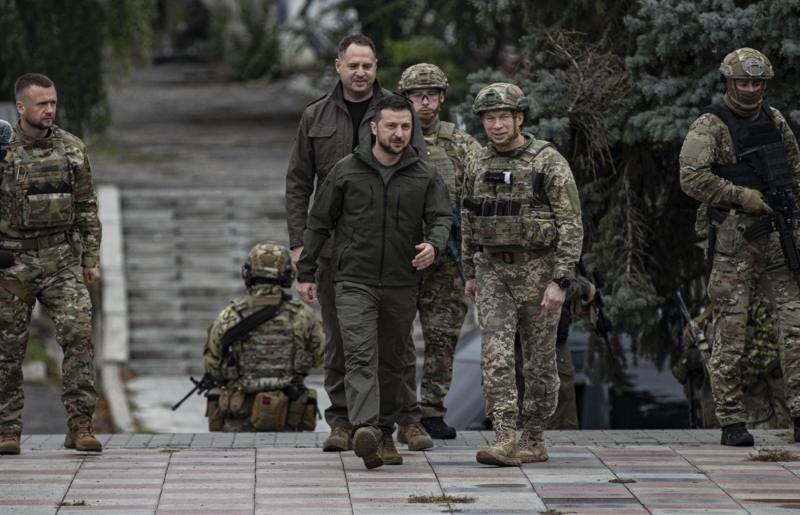
"By that point, the Ukrainian military had got tired of retreating. We felt we needed to strike so hard that the enemy would stagger and crumble," Syrskyi recalled later in an interview.
As the Russians retreated, Syrskyi chose to change his previous plan, which had called for adopting a defensive posture. He instead ordered his forces to pursue the fleeing enemy.
The Slobozhansky Offensive gained the Ukrainian forces a huge amount of captured military equipment. The Wall Street Journal, quoting information from Oryx, even dubbed Russia the main supplier of heavy weaponry to Ukraine’s armed forces.
"The outcome [of the offensive] was much more than we expected. We had planned to liberate approximately two thousand square kilometres less," Syrskyi said later with a smile.
But the most important result of the operation, in his view, was that “Everyone could see that the Russian army, the second largest in the world, can be beaten. That it can and should be defeated, and that they are retreating quite fast.”
It is thought that Vladimir Putin’s declaration of partial mobilisation was caused by these successful Ukrainian military operations. The only way the Ukrainian army’s advance on Svatovo and Kremenna was halted was by throwing thousands of untrained conscripts at the frontline.
The Bahmut Question
While the Slobozhansky Offensive has undoubtedly gone down as one of the most glorious chapters in the war against Russia, an unambiguous assessment of the battles for Bahmut is much harder to offer.
Syrskyi himself admitted that this city, which fell within the responsibility of the grouping under his command, did not represent any significant military value. It became clear, however, in the autumn of 2022, that the capture of Bahmut was a matter of principle for Russian forces, mostly represented by units of the “Wagner” private military company.
The battles for the town became in essence the personal PR project of Wagner leader, Yevgeny Prigozhin. Bahmut’s capture would supposedly compensate for the rout of Russian forces in the region of Kharkiv. As a consequence, by the winter, the battle for Bahmut had become the bloodiest of the war so far, with casualties numbering in the tens of thousands.
According to BBC sources, at a certain point Valeriy Zaluzhny, the armed forces commander-in-chief, called for withdrawing Ukrainian troops from the city. But by that time, Bahmut had become an important symbol for Ukraine’s political leaders: the image of “Fortress Bahmut” had come to stand for the resilience of Ukrainian soldiers and their determination to fight to the end to defend their homeland.
The BBC sources say Zaluzhny failed to get approval for his suggestion to quit the town, and the bloody battles for Bahmut continued until its capture by the Russians in late May last year.
The New York Times reports that at one of their joint meetings in summer 2023, American military strategists strongly advised Ukraine’s generals not to spread their forces between new attacks on Bahmut and the planned major offensive in the south. Zaluzhny accepted the logic, the newspaper wrote.
But in reality, troops under Syrskyi's command made constant attempts to recapture Bahmut. Syrskyi at the time was often talking with western media, and personally asserted the need to keep up attacks on the half-ruined town.
"It's a matter of principle, a matter of honour. We have lost many of our comrades, our servicemen, during the defence of Bahmut... We are simply obliged to take it back," he said in a BBC interview in July 2023.
But following the summer and autumn campaigns, the Ukrainian army failed to seize control of Bahmut, and the diversion of resources for battles for the town was later cited by some experts as one of the reasons for the lack of success of a planned breakthrough by the Ukrainian military to the Sea of Azov.
For their part, those close to Syrskyi claim his troops simply did not receive enough ammunition to complete the task of liberating Bahmut, because the priority at the time was the southern offensive.
"Chances always exist"
Since the time of the combat operations in 2014-2015 in the Donbas, Syrskyi's callsign has been "Bars" – or "Panther".
"I like the beast: it combines cunning, strength, courage, and it doesn’t fear getting into a fight with an opponent much larger in size and strength. We are in such a situation now," he said in an interview with Ukraine’s TSN news outlet.
“The main principle is to avoid full-frontal attacks, head-on actions. You just need to know your capabilities, your strong and weak sides. And know the enemy well, study them, use their strong and weak sides”
People who know Syrskyi say that the general obsessively plans every last detail of his actions.
"The main principle is to avoid full-frontal attacks, head-on actions. You just need to know your capabilities, your strong and weak sides. And know the enemy well, study them, use their strong and weak sides," said Syrskyi.
In some ways, Oleksandr Syrskyi appears to be the opposite of Valeriy Zaluzhny. The former commander-in-chief was revered among rank-and-file soldiers as a father figure, an advocate whom soldiers spoke of with obvious respect, almost in fraternal tones. Syrskyi, according to BBC sources, is much less known among the rank and file and has a reputation for being introverted, keeping a distance from even his closest associates.
Syrskyi is known to wake up at 5.20 am, even if he only came back from a frontline trip at two in the morning. He starts the day with an hour’s exercise, and has installed gym equipment at his headquarters. If he can, he does more sport in the afternoon. Syrskyi doesn’t smoke, barely drinks and tries to eat healthily. His office is always scrupulously tidy.
Whenever he has the chance, his closest associates say Syrskyi will pay a visit to the front. During such trips he picked up an unusual hobby:
"Usually, they head off to the front lines very early and return very late. And he noticed that the sky in eastern Ukraine is especially beautiful, and began to capture this beauty, the juxtaposition of this terrible war and the beauty of nature, in photographs," Hanna Malyar tells the BBC. Syrskyi sends the photos to his closest allies.

What views Syrskyi might hold, as one who has never been among the most public generals of the Ukrainian army, is difficult to say. Unlike his predecessor, during almost two years of major warfare, he has never once appeared in the press with opinion pieces describing his positions on the army, the war, and its future.
On the one hand, BBC correspondent Jonathan Beale writes that Syrskyi enjoys huge respect in the army: soldiers are supposedly impressed by his determination, decisiveness, and cunning.
The general himself considers the people serving in the Ukrainian army to be its most valuable asset. "People are the primary value, and only then come the HIMARS, MLRS, air defence, and artillery," he said in an interview with TSN.
But on the other hand, a number of Ukrainian army officers with whom the BBC spoke said that Syrskyi has a reputation for being an extremely harsh commander, sometimes demanding more from his units than they can realistically achieve.
"His tough approach to conducting military operations has made him unpopular among some soldiers," according to The Economist. "The reputation of the commander of the Ground Forces has firmly established itself as a man for whom completing tasks is more important than the number of lives laid down for the purpose," asserts Ukrainska Pravda.
Supporters of Syrskyi call such accusations PR operations started by the Russians and his opponents within Ukraine. When asked to say exactly who they might have in mind, those interviewed by the BBC refuse to comment, saying that it is a bad idea to further inflame differences during wartime, and that it’s a matter for law enforcement agencies.
Western journalists who have come across Syrskyi often mention his erudition.
"He is very keen on history. If you have time and don't interrupt him, he can talk non-stop about historical events, such as the era of the Roman Empire, in the minutest detail. He just has a unique memory," says Hanna Malyar.
When questioned whether a turning point in the war in favour of Ukraine is possible as things stand now, Syrskyi has said, "Chances always exist. They need to be found and used."
"After our victory"
Western media have long considered Oleksandr Syrskyi the second most important Ukrainian general after Zaluzhny. Syrskyi’s significance was also noted in a way by the Russians: in a recent interview with Reuters, he mentioned "more than one" attempt on his life.
"Anyone who writes about Syrskyi's envy or jealousy towards Zaluzhny simply doesn't know Syrskyi. This man just has a different psychological makeup"
Russian military telegram channels have at least twice reported the killing of Syrskyi. Details of attempts on Syrskyi's life are not disclosed for security reasons: "Let's just say we know what missile strikes are like," he has said.
Syrskyi was also shortlisted for the post of Chief of the General Staff of the Armed Forces in 2019, when newly-elected President Volodymyr Zelensky appointed Ruslan Khomchak, and in July 2021, when Khomchak was replaced by Valeriy Zaluzhny, who at the time was one of Syrskyi’s subordinates.
"Some behind-the-scenes political players may use this fact to try to stir up tension between them. There are even rumours that the presidential administration is leaning towards replacing the popular but independently-minded Zaluzhny with his former boss," wrote The Economist in December 2022.
But in an interview with the publication, Syrskyi harshly commented on the rumours: "The army is outside politics. That’s how it should be, and what the law requires."
"Anyone who writes about Syrskyi's envy or jealousy towards Zaluzhny simply doesn't know Syrskyi. This man just has a different psychological makeup," according to a friend of the new Chief of the General Staff of the Armed Forces in an interview with the BBC.
But there is talk in circles close to power in Kyiv that Syrskyi enjoys a close personal relationship with Zelensky – something Zaluzhny could not count on as far back as spring 2022.
To be sure, one of the main problems for the new Chief of the General Staff will be the implicit competition with his retired predecessor. Ukrainian commentators are already predicting that at every step, whether successful or unsuccessful, Syrskyi will be compared to Zaluzhny.
And the comparison, most likely, will not be in his favour: people will say, "this never happened under Zaluzhny." Especially given that a significant breakthrough in military operations, which could greatly raise the popularity of the new chief, is not anticipated, and that Ukraine stands on the brink of an unpopular new mobilisation.
The circumstances surrounding Valeriy Zaluzhny's dismissal, which thanks to the efforts primarily of the presidential communication team turned into a drawn-out TV series with a bad screenplay, will only add fuel to the fire. As events stand now, experts say that if Zelensky were to name anyone in Zaluzhny’s place, even Napoleon, millions of Ukrainians would still consider such a general to be a political appointee, entirely dependent on the will of the president.
For now, Syrskyi appears to be fully behind Zelensky’s position on another, most important issue facing Ukraine. Last summer, when interviewed by ABC’s Ian Pannell, Syrskyi was asked how he planned to end the war. “We are striving for peace,” he said, “But only after our victory.”
The journalist was not satisfied with this way of phrasing it. He clarified his question: "Share your vision of how the war will end physically. What will it look like?"
"When Ukrainian flags are flying along the entire length of our borders, including Crimea," the general answered in all seriousness.
BBC is blocked in Russia. We’ve attached the story in Russian as a pdf file for readers there.
Read the full story in Russian here.
Additional reporting by Vitaliy Chervonenko, Ilya Barabanov and Anastasiya Lotareva
English version edited by Chris Booth.

